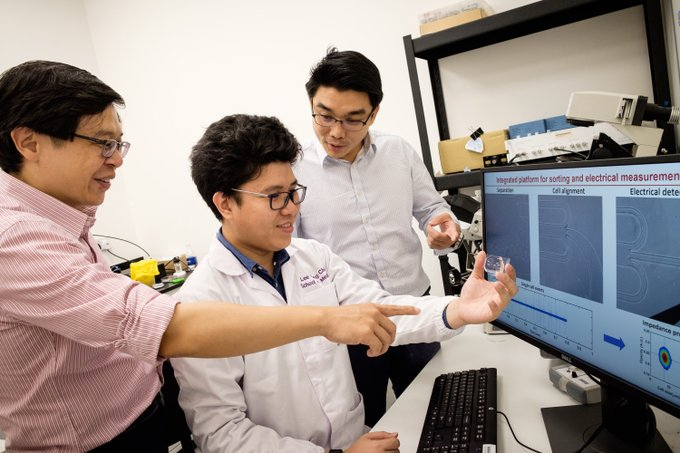
Nanyang Technological University (NTU) researchers have developed a lab-on-a-chip system that is capable of identifying a person's immune system from just a drop of blood within a few minutes.
The scientists claim that by using a tiny microscopic channel that can isolate white blood cells from blood and electrical sensors, the new chip allows detecting differences in the electrical properties of white blood cells taken from healthy people and diabetic patients.
Created by Assistant Professor Hou Han Wei and Assistant Professor Holden Li from the School of Mechanical and Aerospace Engineering, their invention, if successful in the lab and clinical assessments, could be turned into a portable device suitable for family clinics and polyclinics.
The team also believes that in future it will help doctors to quickly gain insight into someone's immune system and spot early signs of inflammation as well as infection that could signal the need for further in-depth tests. It is believed that this device can potentially be an additional screening tool for doctors to use for early detection of heart diseases.
Asst Prof Hou, who is also a faculty member at the Lee Kong Chian School of Medicine at NTU, said that this chip detects electrical differences between a healthy and unhealthy white blood cell. Abnormal white blood cells have been reported as an early biomarker for increased risk of cardiovascular diseases and also suggests an ongoing inflammation.
It was also revealed that by using tiny channels, this chip first separates blood cells by size into the different outlets and then those isolated while cells are run through a special channel where the electrical impedance is measured for each cell at a very high speed.
The electrical impedance of an abnormal cell is usually higher than the impedance of a healthy cell. It should be noted that white blood cells from a significant part of the body's immune system and a key type known as neutrophils are the first line of defence when infection or inflammation attacks a body.
As per Asst Prof Hou, this chip can isolate "thousands of white blood cells from a single drop of blood and, within minutes, tell if these cells are electrically different from normal, which would be an indicator of whether there is a health issue to be further investigated."
This process doesn't use any chemical biomarkers or antibodies, "which makes the assay cheap, easy to use, and that we can do further analysis on the same white blood cells we have already run through the chip," he said.
It can be expected that this new device could also be very useful for the study of NETosis, which is a newly discovered defence mechanism in the field of immunology. In addition, NETosis expert, Assistant Professor Christine Wong, from NTU's Lee Kong Chian School of Medicine, said that this chip "may enable rapid and non-biased NETosis experiments and quantification, which will be especially useful for drug screening ex-vivo."









